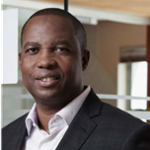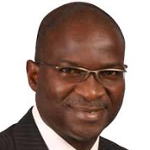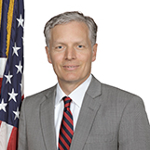- Registration
- Welcome Reception
Sponsored by Citi, 145 West Street, Sandown, Sandton
Please join us as we kick off the U.S.-Africa Infrastructure Conference with a welcome reception.
Citi Offices are a 10 minute walk from the Hilton.
- Registration/Check-in
- Opening Plenary | Innovation: The Key to Africa's 21st Century Infrastructure
Sola David-Borha•Farid Fezoua•William Killeen•David Picard•Ramsey DayFor the past two decades, increased investment in infrastructure has been one of the main drivers behind Africa’s economic growth. However, the potential is far from met. According to a recent World Bank report, despite progress over the past quarter century, a significant infrastructure gap remains a major bottleneck to development on the continent. The analysis shows that if the infrastructure gap were closed relative to specific achievable benchmarks, economic growth would increase by at least 1.7 percentage points per year in Sub-Saharan Africa. Though public investment has increased in recent years, it is still insufficient to meet the infrastructure financing needs. More attention is needed on how innovative technologies and approaches, including leveraging public private partnerships can provide Africa’s expanding population with reliable electricity, affordable housing, and efficient transport and other critical infrastructure.
Panelists in this high-level plenary will discuss the development of infrastructure space, how they are approaching major projects, overcoming key constraints, and seizing new opportunities.
Sola David-Borha
Chief Executive, Africa Regions at Standard Bank
Farid Fezoua
President and CEO: Sustainable Healthcare Solutions - Africa of General Electric Company (GE)
William Killeen
President at Acrow Bridge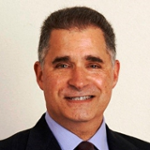
David Picard
General Manager Africa and Middle East at Caterpillar Inc.
Ramsey Day
Senior Deputy Assistant Administrator, Africa Bureau at USAID
- Networking Break
- Renewable Energy: Growth of Energy Storage in Africa
John F. DeBoever•Jacob Flewelling•Rakesh Maharaj•Bertie Strydom•Julian OtengEnergy storage technology is a potential game-changer for widespread adoption of renewable energy throughout Africa. The International Energy Agency “estimates that by 2020, developing countries will need to double their electrical power output to meet rising demand. It is estimated that by 2035, these nations will represent 80 percent of the total growth in both energy production and consumption. To meet international goals for reduction of greenhouse-gas emissions, a substantial portion of this new generation capacity will likely come from renewable sources. While the costs for renewable generation continue to fall, integrating and effectively using these new resources, especially in regions with weak grid infrastructure, will require energy storage”.
Panelists will explore the innovative energy storage solutions being deployed on the continent and examine the policy changes required to promote these solutions.
John F. DeBoever
Vice President, Global Sales at UniEnergy Technology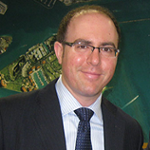
Jacob Flewelling
Africa Business Development Manager at U.S. Trade and Development Agency (USTDA)
Rakesh Maharaj
Energy Leader at Primus Power
Bertie Strydom
Senior Project Development Manager at Industrial Development Corporation (IDC)
Julian Oteng
Director of Operations & Founder at Xago Africa
- Revolutionizing Africa's Transportation
Benji Coetzee•David Ocholi•Witney Schneidman•Paul Sullivan•Admassu TadesseTransportation is vital to trade and commerce, and of course necessary to the movement of people who transact in goods and services. Transportation infrastructure—including roads, rail, bridges and ports—is crucial to spur economic and social activity within individual countries and to support regional integration within Africa. In recent years, new developments in the technology sector have shaken-up the continent’s transport industry. Many innovations in the transport sector – from drones and apps to payment and tracking mechanisms – are becoming more widely available and are reducing the time and cost of transportation.
Panelists will discuss the innovative technologies that are positively “disrupting” the transportation space and highlight novel and well-tailored incentives for transportation project developers and investors across the continent.
Benji Coetzee
CEO of Empty Trips
David Ocholi
Commercial Manager, Global Trade Digitization at Maersk
Witney Schneidman
Senior International Advisor for Africa at Covington & Burling LLP
Paul Sullivan
Senior Vice President - International at Acrow Bridge
Admassu Tadesse
President and CEO of Trade and Development Bank
- Lunch
- Economic Dividends of Air Connectivity
Adefunke Adeyemi•Cheryle Jackson•Vuyani Jarana•Esther Ndichu•Sean SmithThe aviation sector in Africa illustrates that non-physical barriers – including inadequate regulation or uncoordinated government action – can create impediments to infrastructure development. According to a survey by the International Air Transport Association (IATA), if only 12 key African countries opened their markets and increased connectivity, an additional 155,000 jobs and US$1.3 billion in annual GDP would be created in those markets. So far, 23 countries have pledged to remove non-physical barriers to air routes and ultimately create a single aviation area across the continent. In particular, businesses operating on the continent would benefit from the Single African Air Transport Market (SAATM) through increased intra-connectivity, expanded access to new markets, improved trade facilitation, and anticipated growth in tourism.
Panelists will discuss how the aviation industry is positioning itself to benefit from SAATM.
Adefunke Adeyemi
Regional Head, Member and External Relations, Africa and Middle East at International Air Transport Association (IATA)
Cheryle Jackson
Vice President, Global Business Development at AAR Corp
Vuyani Jarana
Chief Executive Officer at South African Airways
Esther Ndichu
Managing Director of UPS South Africa
Sean Smith
President-Africa at Honeywell
- Leveraging Technology to Improve African Healthcare Infrastructure
Ernest Darkoh•Peter Mehlape•Jeffrey SturchioAccess continues to be a major challenge to healthcare delivery in Africa, with fewer than 50% of Africans having access to modern health facilities. Healthcare is also losing an estimated $300 billion per year in untapped data integration. Better access to state-of-the-art facilities, medical equipment and secure healthcare data will empower both patients and healthcare providers, lower costs, and improve outcomes. Through innovations in public-private partnerships, procurement processes and big data analytics, healthcare providers can enhance how information is shared, improve medical supply chains and strengthen service delivery.
Panelists in this session will address: utilizing PPPs and technology to close the healthcare gap; leveraging available/existing data to strengthen healthcare systems; exploring new technologies and data visualization for swift decision making; and how we can successfully use these tools/strategies in health systems on the continent. - Project Finance
Project finance provides a viable solution to Africa’s infrastructure deficit, which the African Development Bank estimates to be in the range of $130-170 billion per annum. Within Sub-Saharan Africa, this financing technique has been used to mobilize private sector investment across a range of sectors, including oil and gas, mining, power, transport and water as well as social infrastructure projects, such as hospitals and prisons. Implementing project finance transactions in Sub-Saharan Africa can present investors with major challenges, including policy uncertainty, insufficient political will, and weak regulatory environments, but major opportunities as well.
In this panel discussion, we consider how sponsors, lenders and other participants can successfully develop projects through various strategies, including risk analysis and mitigation, engagement with regulators and dispute resolution. - Need Based Innovation
Shafin Anwarsha•Bola Bardet•Neil Gordon•Justine Letard•Nicole Smith•Tania HabimanaWhat happens when a continent skips an era, enters directly into the digital age, having left all its fundamental needs unresolved? Needs are resolved using innovation & digital technologies.
As recent trends and reports have demonstrated, Africa has been at the forefront of revolutionary, pioneering techniques that emanated from a fundamental need as opposed to a desire to improve or transform current technologies as can be seen in neighboring developed economies. Today more than ever, African countries are realizing this latent potential and seeking out new opportunities for growth to move beyond business as usual through encouragement of such innovations through the emergence of incubation hubs and acceleration programs. Indeed, since the World Bank’s African tech hub study, the number of active tech hubs across Africa has grown by over 50%: from 314 in 2016 to 442 hubs now active on the continent. However, despite this formalization of innovation, the continents particularity lies in its diversification. The question lies in the continent’s ability to scale and leverage these innovations to benefit society at large.
This panel will visit the concept of needs-based innovation and its implication on the African continent, from creating a new generation of tech-savvy schoolers to digitally-operated smart cities and institutions.
To inspire and acknowledge Africa’s tech advancements, the panelists will share their innovations, experience bringing these to life and discuss the future of needs-based innovation on a continent that is forever growing.
- Registration/Check-in
- Plenary | Catching the Broadband Wave
Kalidou Gadio•Charmaine Houvet•Mohale Ralebitso•Pierre GuislainAfrica has experienced an ICT revolution because of gains in mobile connectivity. In 2017, the continent had 444 million unique mobile subscribers and 747 million sim connections. In 2017, the mobile industry contributed 7.1 % of the continent’s GDP, about $110 billion - expected to reach $150 billion in 2022. Mobile connectivity has facilitated consumer access to education, health, government and financial services, and more. The next wave of growth in the ICT sector will come through broadband connectivity which represented 38% of total mobile connectivity in 2017 and is expected to reach 87% in 2025. Actors in the ICT sector have recognized the multiplier effect of broadband and are positioning themselves through investment and innovation in this technology.
The panelists will discuss how broadband connectivity is reshaping the ICT sector and how they are investing to benefit from the next growth wave.
Kalidou Gadio
Co-Chair Africa & MENA Practice at Manatt, Phelps & Phillips, LLC
Charmaine Houvet
Public Policy Director Africa of Cisco South Africa
Mohale Ralebitso
CEO and Co-founder of Ralco Investments
Pierre Guislain
Vice President, Private Sector, Infrastructure and Industrialization at African Development Bank
- Networking Break
- Meeting Africa’s Rising Energy Demands
Adesua Dozie•Babatunde Fashola•Richard Nelson•Gbemi OtudekoAlthough power output has increased across the African continent over the last decade, it generally falls short of household and commercial demand. Rationing of electricity is far too prevalent, hindering manufacturing and industrial development and dampening investor confidence. Broadening the “energy mix”, i.e the composition of the primary energy sources – has been necessary to increase volume, affordability and sustainability of power supply.
Panelists will highlight how technology facilitates the price-efficient use of different sources of energy in electricity power supply on the continent. - Increasing Local Participation in Infrastructure Development
Olanike Anani•Emmy Leeka•Masilo FishaStronger participation by SMEs in global markets creates opportunities to scale up and enhance productivity, by accelerating innovation, knowledge transfer of technology and managerial know-how, and by broadening and deepening skillsets needed in infrastructure development. This session will address strategies for SME integration into largescale infrastructure projects on the continent.
- Lunch
- Closing Plenary | Strategic Investment in Emerging Markets
Pascal Agboyibor•Justin DeAngelis•Peter Sullivan•Phumzile Langeni•Jonathan NashAfrican government budget resources, in partnership with various multilateral finance institutions, have traditionally been the primary source of infrastructure financing. However, in the recent years, the scope of funding sources has expanded from both foreign government and private financier sources. The amount of financing needed to close the continent’s infrastructure deficit is a small fraction of that potentially available in the international financial system. Nonetheless, the so-called financing gap for infrastructure projects remains. The answer to this anomaly may well turn on the terms of financing and whether financing is being appropriately directed to develop and execute viable projects.
This panel of U.S. and African institutional investors will discuss their complementary and perhaps competing roles towards filing the financing gap in the Africa infrastructure sector.
Pascal Agboyibor
Attorney at Law at Orrick
Justin DeAngelis
Managing Director of Denham Capital Management
Peter Sullivan
Managing Director, Head of Public Sector Africa at Citi
Phumzile Langeni
Presidential Special Investment Envoy at Republic of South Africa
Jonathan Nash
Chief Operating Officer at Millenium Challenge Corporation

